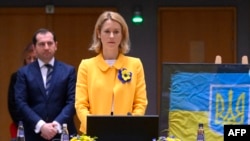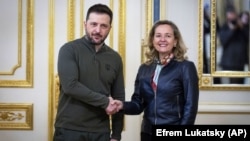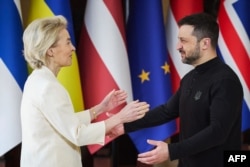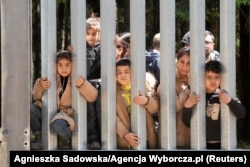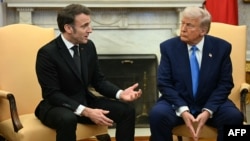
Welcome to Wider Europe, RFE/RL's weekly newsletter focusing on the key issues concerning the European Union, NATO, and other institutions and their relationships with the Western Balkans and Europe's Eastern neighborhoods.
I'm RFE/RL Europe Editor Rikard Jozwiak, and this week I'm drilling down on one thing: how the EU can stay relevant in the Ukraine peace talks.
The Briefing: The Sidelined EU's Gameplan On Ukraine
After two weeks on the sidelines, with the United States and Russia now in direct talks over the future of Ukraine -- and, in many ways, the continent itself -- the European Union is scrambling to stay relevant.
With European leaders, including non-EU Britain, meeting in various formats -- twice in Paris (February), online on February 26, in London on the weekend (March 2), and an extra summit in Brussels scheduled for March 6 -- the contours of a strategy are beginning to emerge.
According to EU diplomats I have spoken to, the main line of approach is to support “peace through strength,” meaning that Ukraine should be in the best possible position for eventual talks with the Kremlin. And there is not much time to make this happen, with European officials telling me that their American interlocutors have indicated they want to see the war concluded within a month.
What does this mean in practice for the bloc? Ideally, to secure a seat at the table, even though this seems unlikely.
One European Union ambassador told me that Donald Trump isn’t “dealing with institutions.” As a result, French President Emmanuel Macron has stepped up by hosting the Paris meetings and being the EU leader to secure a formal sit-down with the U.S President in Washington.
European officials concede that no European leader -- institutional or otherwise -- is likely to participate directly in the peace talks, at least initially. However, there is ongoing discussion about appointing a “Ukraine talks envoy,” though a candidate may not be named at this week’s EU summit.
For now, the bloc is instead focusing broadly on four key areas: planning for European boots on the ground in Ukraine, boosting Ukrainian and European defense, reassessing sanctions on Russia, and advancing Ukraine’s path toward EU membership.
Finding Money For Ukrainian Defense…
Ukraine has put forward a concrete figure for its battleground needs this year -- 66 billion euros ($68.5 billion). This is the sum Ukrainian Foreign Minister Andriy Sybiha proposed when he addressed EU foreign ministers on February 24.
Previously, an informal deal had been in place, in which Ukraine would stump up 40 percent of that money, with the EU and the United States sharing the remaining 60 percent equally.
Now, with the United States possibly stepping back entirely, Ukraine has offered to pay 50 percent, with the EU footing the bill for the other half, meaning some 33 billion euros is needed from Brussels.
A concrete plan is already on the table, presented to member states by EU foreign policy chief Kaja Kallas. According to this plan, which has been seen by RFE/RL, most of the funding would come from EU member states, proportionate to their gross national income (GNI), while the rest would be sourced from windfall profits generated by frozen Russian assets within the bloc.
Since the scheme is voluntary, it can circumvent any potential vetoes from countries like Hungary, for example, which has blocked previous EU initiatives to send cash to Kyiv.
The idea is to finalize the details and agree on a sum at the upcoming Brussels summit. The diplomats I have spoken to are hopeful of securing a commitment of at least 25 billion euros ($26 billion).
…And For European Defense
But what about the EU’s own defense spending?
Under pressure from the new Trump administration, European nations need to increase domestic defense spending by several percentage points.
While many doubtless will try to find space for this in their national budgets, there are ongoing talks in Brussels on various creative solutions for how the EU can help member states with funding.
The European Investment Bank (EIB) has opened up the possibility of investing more in various European defense projects, but the bank is wary about splashing too much cash, because this could jeopardize its triple-A credit rating, which it is using to raise money in the first place.
Another idea that has been circulating is to use the estimated 93 billion euro ($96.5 billion) of post-COVID-19 recovery funds that are still available in the EU’s coffers.
There are two obstacles to this, however.
The first one is Germany’s powerful Constitutional Court. When the facility was created via joint EU borrowing, the court green-lighted it with the proviso that it should be spent on pandemic recovery and could not be repurposed for other spending.
Secondly, a repurposing of the funds would need consensus from all member states, and few officials I have spoken to believe that the Moscow-friendly governments in Bratislava and Budapest would agree to this.
Perhaps the most promising solution would be to use the cohesion funds that are still available in the seven-year EU budget, which ends in 2027.
Only 6.5 percent of more than 300 billion euro ($311 billion) in this budget envelope has been spent so far. The question, however, is whether EU member states are willing to forego this cash, which is essentially a money transfer from Brussels to the poorest regions in the bloc.
Boots On The Ground In Ukraine?
One issue that European nations hope could keep them relevant in the peace talks is the idea of deploying troops in Ukraine to oversee a potential cease-fire settlement.
There aren’t many concrete details yet, but so far France and the United Kingdom, as well as Turkey, have toyed with the idea of sending troops there. There is also hope that Berlin will consider such a move once a new German government is formed following the February 23 general elections.
However, other bigger European countries, such as Italy and Poland, have voiced clear reservations about this, with Warsaw’s hesitancy being shaped by its upcoming presidential elections in May.
The two issues to consider here would be what exactly the troops would do and what role the United States would have, if any.
One European diplomat dealing with defense issues said that the main question now is: “What are we sending our boys into?” And the answer to that question will determine the scale of any troop deployment. Another admitted that there could be at least 20,000 military personnel deployed in urban areas and around critical infrastructure sites in western Ukraine.
The key factor, however, is the American role, even if it appears that no U.S. soldiers will participate. Despite this, the Europeans would need what they call “a U.S backstop” -- essentially intelligence, air defense cover, and capabilities for moving troops around, such as airlifts.
Is Ukraine's EU Membership Path Opening Up?
While it seems clearer that the United States has ruled out Ukrainian NATO membership for now, the path to EU membership is still very much in play and it has been potentially shortened.
Speaking in Kyiv on February 24, European Commission President Ursula von der Leyen said Ukraine could join the club by 2030.
This is very ambitious, but is it realistic?
It is worth noting that von der Leyen’s mandate ends in 2029, so it’s not really her call. And she is far from the only decision-maker in this matter, with the 27 EU member states free to veto every stage of the accession process.
But it is true that Kyiv is inching closer.
Next year the country’s electricity market will be incorporated into the EU’s and accession negotiations should start in earnest as early as this spring.
In total, there are 33 policy chapters with laws and regulations that Kyiv has to incorporate into its national legislation. These 33 chapters are divided up into six clusters, and the current plan in Brussels is that at least three clusters could be opened in 2025.
But there are obstacles.
Notably, Hungary is blocking the opening of the first cluster, which deals with what is known in Brussels as “the fundamentals,” such as the rule of law and human rights. Budapest is insisting on the inclusion of protections for ethnic minorities, particularly the Hungarian community in Ukraine, as part of the opening benchmarks. So far, this issue remains at a stalemate.
Sanctions As A Negotiation Tool?
The EU recently adopted its 16th sanctions package against Moscow, hitting Russia’s aluminum exports to the bloc as well as the Russian shadow fleet and the country’s media, among other things.
A new package is already being talked about, but it is unlikely to include hard-hitting measures, such as targeting Russian liquefied natural gas and nuclear power, as many EU member states are wary of skyrocketing energy prices.
But the EU is also facing increased difficulties with extending the Russia sanctions by unanimity.
Budapest threatened to nix the rollover of sectoral economic sanctions against the Kremlin at the end of January, and it secured assurances that Russian oil would continue to flow to Hungary.
By March 15, the bloc needs to agree on another six-month prolongation. This time, in order to green-light the extension, Hungary wants to remove eight names from the list of more than 2,400 individuals and companies that the EU has subjected to asset freezes and visa bans, including oligarchs such as Pyotr Aven, Mikhail Fridman, Dmitry Mazepin, and Viatcheslav Moshe Kantor.
The ensuing uncertainty over these punitive EU measures is endangering one of Brussels’ biggest bargaining chips vis-a-vis Moscow -- the scaling up and down of sanctions that are hurting the Russian economy.
Take, for example, nearly 200 billion euros’ ($207.5 billion) worth of frozen assets in the club, located mainly in Belgium.
While some member states want to confiscate this money immediately to bolster Ukrainian or European defense, big countries like Germany and France see it as valuable leverage for potential future negotiations. With the Kremlin in need of liquidity, it’s likely Russia will be asked to cover part of Ukraine’s reconstruction costs.
Looking Ahead
EU home affairs ministers are meeting tomorrow on March 5 to finally agree on a gradual rollout of the bloc’s Entry/Exit System (EES).
The system -- expected to take effect in the final quarter of this year -- will require non-EU citizens who cross any border or enter any airport or harbor in 25 EU countries (all member states apart from Cyprus and Ireland) and four non-EU countries (Norway, Iceland, Switzerland, and Lichtenstein) would have to register their full name, nationality, and have their fingerprints and photograph taken. The scheme was first proposed in 2017 and was supposed to be rolled out last year.
That's all for this week! Feel free to reach out to me on any of these issues on Twitter @RikardJozwiak, or on e-mail at jozwiakr@rferl.org.
Until next time,
Rikard Jozwiak
If you enjoyed this briefing and don't want to miss the next edition, subscribe here.






